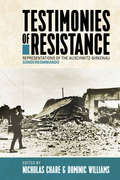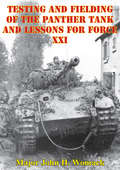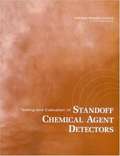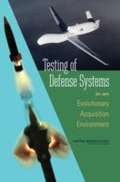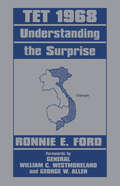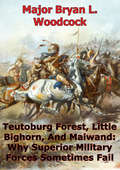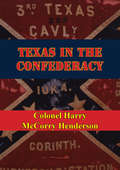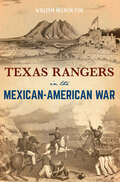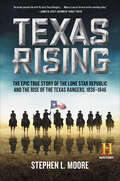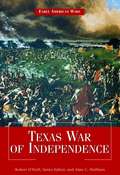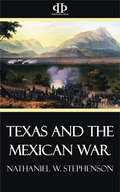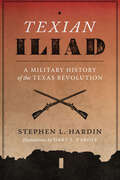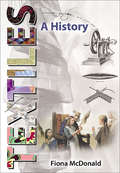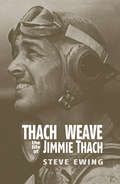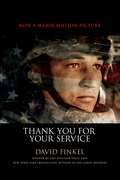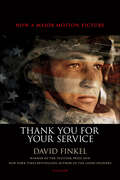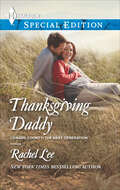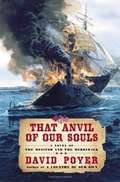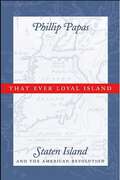- Table View
- List View
Testimonies of Resistance: Representations of the Auschwitz-Birkenau Sonderkommando
by Nicholas Chare Dominic WilliamsThe Sonderkommando—the “special squad” of enslaved Jewish laborers who were forced to work in the gas chambers and crematoria of Auschwitz-Birkenau—comprise one of the most fascinating and troubling topics within Holocaust history. As eyewitnesses to and unwilling abettors of the murder of their fellow Jews, they are the object of fierce condemnation even today. Yet it was a group of these seemingly compromised men who carried out the revolt of October 7, 1944, one of the most celebrated acts of Holocaust resistance. This interdisciplinary collection assembles careful investigations into how the Sonderkommando have been represented—by themselves and by others—both during and after the Holocaust.
Testing And Fielding Of The Panther Tank And Lessons For Force XXI
by Major John H. WomackThere are several historical instances of the problems caused when equipment is rushed in production and fielded too soon. A great example of this was the German rush to field the new Panther tank before the Battle of Kursk during the Second World War. Unlike the U. S. Army today, the Germans were trying to develop, test and field a major weapon system while fighting a war. It can be argued that the Panther tank was the finest tank built during the Second World War, but it certainly did not make its appearance on the battlefield with great distinction. The study of the Panther tank shows the dangers the U. S. Army faces today as the Army tests equipment that will digitize the battlefield. The Panther clearly shows three potential pitfalls of new equipment. These pitfalls are:*the user of the equipment must have input to the design and development,*new tactics were not formulated to capture the advantage of the new equipment,*logistics required for fielding the new equipment must be in place.Each of these pitfalls caused significant problems for the Panther tank. They can cause significantly more problems for the Army as the equipment being tested and fielded today will be used largely for command and control.Today's U.S. Army has the potential to experience the pitfalls of the Panther. As the Army moves to digitize the battlefield it will use information technologies that it hopes will produce disproportional lethality...If we do not pay attention to the lessons learned from past fielding of equipment, and more importantly, the possible consequences of introducing equipment not yet fully tested to the field, the Army will create more problems for itself with the new technologies used in Force XXI.
Testing and Evaluation of Standoff Chemical Agent Detectors
by National Research CouncilThe report provides an independent assessment of suitable test protocols that might be useful and reliable for the testing and evaluation of standoff chemical agent detectors. The report proposes two testing protocols, one for passive detectors and one for active detectors, to help ensure the reliable detection of a release of chemical warfare agents. The report determined that testing these detectors by release of chemical warfare agents into the atmosphere would not provide additional useful information on the effectiveness of these detectors than would a rigorous testing protocol using chemical agents in the laboratory combined with atmospheric release of simulated chemical warfare agents.
Testing of Body Armor Materials: Phase 3
by National Research Council of the National AcademiesThis report is the final volume of a three-phase study commissioned by the Director of Operational Test and Evaluation (DOT&E) of the Department of Defense (DoD) to assist in addressing shortcomings that had been reported by the Government Accountability Office (GAO) and the DoD Inspector General in DoD’s body armor testing process. Independent committees were empanelled for the three study phases. Each committee produced an independent report, although this final Phase III report builds on the results of the letter reports delivered in Phases I and II, both of which provided findings and recommendations on key issues that required near-term resolution by DOT&E. The study was conducted under the auspices of the National Research Council (NRC) Board on Army Science and Technology (BAST) and Committee on National Statistics.
Testing of Defense Systems in an Evolutionary Acquisition Environment
by National Research Council of the National AcademiesThe National Academies Press (NAP)--publisher for the National Academies--publishes more than 200 books a year offering the most authoritative views, definitive information, and groundbreaking recommendations on a wide range of topics in science, engineering, and health. Our books are unique in that they are authored by the nation's leading experts in every scientific field.
Tet 1968: Understanding the Surprise (Studies in Intelligence)
by Captain Ronnie FordThis book brings to light many aspects of the Tet offensive of 1968, an event acknowledged as the turning-point of the Vietnam War. Using previously unseen Communist Vietnamese documents combined with sources of Western origin, the author provides a more accurate version of the events, their significance, and reveals the crucial role played by US intelligence.
Tet Offensive 1968
by James ArnoldOsprey's study of the 1968 Tet Offensive, which was the decisive battle for Vietnam (1955-1975). Masterminded by the brilliant North Vietnamese General, Vo Nguyen Giap, it was intended to trigger a general uprising in South Vietnam. However, the bloody fighting for Saigon, Hue and other cities actually resulted in a catastrophic defeat for the North. In this excellent assessment of the key battle of the Vietnam conflict, James Arnold details the plans and forces involved and explains how, despite the outcome of the battle, the American people and their leaders came to perceive the war for Vietnam as lost.
Teutoburg Forest, Little Bighorn, And Maiwand: Why Superior Military Forces Sometimes Fail
by Major Michael T. GrissomUsually in history it seems that the technologically advanced society has a greater advantage in warfare than more primitive societies. For most battles this seems to hold true; however, there are exceptions to this rule. This document examines three different battles in history where a primitive, tribal force was able to decisively defeat a better-equipped, more advanced army. Following the introduction the second chapter focuses on the Romans versus Germanic tribes at the Battle of Teutoburg Forest; the third chapter investigates Custer and the Battle of the Little Bighorn; and the fourth chapter discusses the Battle of Maiwand in the Second Afghan War. Although each of these battles has its own unique circumstances that contributed to the victory of the primitive forces, three main themes link each of the battles. In each battle the technologically advanced army followed predictable tactics. The primitive armies employed new tactics that generally served to negate some of the technological advantages of the superior force. And finally, cultural influences played a role in strengthening the resolve to fight despite apparently poor odds. In each of the battles these factors combined with others to produce a victory over a technologically advanced foe.
Texans in Revolt: The Battle for San Antonio, 1835
by Alwyn BarrThe first comprehensive history and analysis of the Siege of Béxar in early nineteenth-century Texas.While the battles of 1836—the Alamo, Goliad, and San Jacinto—are well-known moments in the Texas Revolution, the battle for Béxar in the fall of 1835 is often overlooked. Yet this lengthy siege, which culminated in a Texan victory in December 1835, set the stage for those famous events and for the later revolutionary careers of Sam Houston, James Bowie, and James W. Fannin.Drawing on extensive research and on-site study around San Antonio, Alwyn Barr completely maps the ebbs and flows of the Béxar campaign for the first time. He studies the composition of the two armies and finds that they were well matched in numbers and fighting experience—revising a common belief that the Texans defeated a force four times larger. He analyzes the tactics of various officers, revealing how ambition and revolutionary politics sometimes influenced the Texas army as much as military strategy. And he sheds new light on the roles of the Texan and Mexican commanders, Stephen F. Austin and Martín Perfecto de Cos.As this excellent military history makes clear, to the famous rallying cry &“Remember the Alamo!&” &“Remember Goliad!&” should be added: &“And don't forget San Antonio!&”&“Will most likely remain for some time the standard work on this battle. Outstanding scholarship and research are reflected in the book, including on-site study of the locale. . . . This is an important military history, and as such, it should be in all Texana collections.&” —Review of Texas Books&“This is a significant contribution to the study of Texas history. Texans in Revolt will be the standard work on this campaign.&” —Ralph A. Wooster, Associate Vice President and Regents Professor, Lamar University
Texans in Revolt: The Battle for San Antonio, 1835
by Alwyn BarrThe first comprehensive history and analysis of the Siege of Béxar in early nineteenth-century Texas.While the battles of 1836—the Alamo, Goliad, and San Jacinto—are well-known moments in the Texas Revolution, the battle for Béxar in the fall of 1835 is often overlooked. Yet this lengthy siege, which culminated in a Texan victory in December 1835, set the stage for those famous events and for the later revolutionary careers of Sam Houston, James Bowie, and James W. Fannin.Drawing on extensive research and on-site study around San Antonio, Alwyn Barr completely maps the ebbs and flows of the Béxar campaign for the first time. He studies the composition of the two armies and finds that they were well matched in numbers and fighting experience—revising a common belief that the Texans defeated a force four times larger. He analyzes the tactics of various officers, revealing how ambition and revolutionary politics sometimes influenced the Texas army as much as military strategy. And he sheds new light on the roles of the Texan and Mexican commanders, Stephen F. Austin and Martín Perfecto de Cos.As this excellent military history makes clear, to the famous rallying cry &“Remember the Alamo!&” &“Remember Goliad!&” should be added: &“And don't forget San Antonio!&”&“Will most likely remain for some time the standard work on this battle. Outstanding scholarship and research are reflected in the book, including on-site study of the locale. . . . This is an important military history, and as such, it should be in all Texana collections.&” —Review of Texas Books&“This is a significant contribution to the study of Texas history. Texans in Revolt will be the standard work on this campaign.&” —Ralph A. Wooster, Associate Vice President and Regents Professor, Lamar University
Texas Granite: Story of a World War II Hero
by Mary HartmanJack commanded a Marine Company during the bloody battle for Iwo Jima. There he earned the nation is highest decoration, The Medal of Honor, posthumously. Before the Marines there was football and baseball at Ennis High School, Texas Military College, Baylor University, and then football with the New York Giants.
Texas In The Confederacy
by Colonel Harry McCorry Henderson"An accurate and absorbing account of all the Civil War campaigns in which any Texas organizations participated - such famous units as Hood's Texas Brigade, Walker's Division, Terry's Texas Rangers and Sibley's Arizona Brigades, as well as many little-known ones.Texas troops fought in every theater of the Civil War outside the state, and at home had problems to contend with that most of the other states didn't have; a long coastline and a long frontier had to be guarded, one from the federals and the other from the Indians.The most brilliant operation fought, says Colonel Henderson, was the battle of Sabine Pass, September 8, 1863. The young lieutenant Dick Dowling and a company of 44 Irish guards successfully defended against an invasion attempt at the mouth of the Sabine River by a force of 5000 union soldiers. A full account of this engagement in the terms of a professional soldier is given under the "1st Heavy Artillery Regiment" chapter.One of the most daring plans of the South, aimed at seizing the entire Southwest to the California coast, was the invasion of New Mexico by a brigade of Texans under Harry Hopkins Sibley. The little-known story of this brigade and the battles it fought in the arid territory along the Rio Grande in New Mexico are told in the intensely human chapter on "Sibley's Arizona Brigade".TEXAS IN THE CONFEDERACY is doubly valuable for bringing together all the organizations into one handy book, and for creating through this compilation a stirring story of patriotism, bravery, humor and action that will be a source of pride for every Texan and of exciting reading for all."-Print ed.
Texas Rangers in the Mexican-American War
by Arcadia PublishingFor the Texas Rangers, the Mexican-American War was an opportunity for vengeance. When the United States declared war on Mexico in 1846, the Texas Rangers were eager to settle scores with their familiar foe and quickly became the eyes and ears of the US army. Commanded by established legends like Samuel H. Walker, Benjamin McCulloch, and John "Jack" Coffee Hays, Texas Rangers led the American charge at Monterrey and saved General Taylor's army at Buena Vista. However, their depredations on Mexican citizenry were often excessive, and their behavior, along with other volunteers, sparked Mexican resistance. However crucial they were to US victory, it is also indisputable that they earned a reputation for brutality even in a vicious war.. Author William Nelson Fox follows these larger than life figures into stories of heroism and villainy at the heart of the Mexican-American War.
Texas Rising: The Epic True Story of the Lone Star Republic and the Rise of the Texas Rangers, 1836–1846
by Stephen L. MooreThe official nonfiction companion to HISTORY’s dramatic series Texas Rising (created by the same team that made the ratings record-breaker Hatfields & McCoys): a thrilling new narrative history of the Texas Revolution and the rise of the legendary Texas Rangers who patrolled the violent western frontierMarch 1836: The Republic of Texas, just weeks old, is already near collapse. William Barret Travis and his brave defenders of the Alamo in San Antonio have been slaughtered. Hundreds more Texan soldiers have surrendered at Goliad, only to be marched outside the fortress and executed by order of the ruthless Mexican general Santa Anna, a dictator denying Texans their freedom and liberty.General Sam Houston—a hard-drinking, hot-tempered opportunist—remains in command of a small band of volunteer colonists, mercenaries, and the newly organized Texas Rangers. They are the last hope for Texas to challenge the relentless advance of Santa Anna’s much larger Mexican Army—yet many of them curse Houston, enraged by his decision to retreat across Texas before the advancing enemy.The exhausted, outnumbered rebels will meet their destiny on an empty plain near the Gulf Coast next to the San Jacinto River—and make a stand that determines the fate of the young nation. “Remember the Alamo!” and “Remember Goliad!” will be the battle cries, and the order of the day will echo Travis’s at the Alamo: Victory or death.Acclaimed Texas historian Stephen L. Moore’s new narrative history tells the full, thrilling story of the Texas Revolution from its humble beginnings to its dramatic conclusion, and reveals the contributions of the fabled Texas Rangers—both during the revolution and in the frontier Indian wars that followed.
Texas War of Independence
by Alan C. HuffinesIn this fascinating story, readers learn about the Texas War of Independence from its outbreak in 1835 to the Battle of the Alamo to winning independence at the Battle of San Jacinto in 1836. Readers will be wowed by the fact that at the Battle of San Jacinto, the Texans, led by Sam Houston, defeated the Mexican army in just eighteen minutes. The book includes many more fascinating background details. It includes a personal portrait of Mexican soldier Juan Almonte, information about the Jacksonian era, a story about civilian Angelina Dickenson (the baby who survived the Alamo battle), and an analysis of Texas independence and annexation to the United States.
Texas and the Mexican War
by Nathaniel W. StephensonTHAT American diplomat known to his contemporaries as "the eel-like Monroe" gave Manifest Destiny a deep offense which popular memory has let slip. He bartered away, as his enemies said, our claim to the country between the Sabine and the Rio Grande. However shadowy that claim was, there were patriotic Americans in the year 1819 who wanted the country. The shadowiness of the claim was not worth mentioning, they thought. Napoleon sold us something in the Southwest and surely we, with Manifest Destiny on our side, were the best judges of what old Louisiana included. Monroe took a narrower view; and when he acquired Florida from Spain and rounded out the eastern coast line, but stopped at the Sabine on the west, there was wrath in many American hearts, and some bold Americans were ready to stake their heads for the rectification of their government's error.
Texian Iliad: A Military History of the Texas Revolution
by Stephen L. HardinThe first complete history of the nineteenth-century revolt, drawing on original Texan and Mexican sources and on-site inspections of almost every battlefield.Hardly were the last shots fired at the Alamo before the Texas Revolution entered the realm of myth and controversy. French visitor Frederic Gaillardet called it a “Texian Iliad” in 1839, while American Theodore Sedgwick pronounced the war and its resulting legends “almost burlesque.”In this highly readable history, Stephen L. Hardin discovers more than a little truth in both of those views. Drawing on many original Texan and Mexican sources and on-site inspections of almost every battlefield, he offers the first complete military history of the Revolution. From the war’s opening in the “Come and Take It” incident at Gonzales to the capture of General Santa Anna at San Jacinto, Hardin clearly describes the strategy and tactics of each side. His research yields new knowledge of the actions of famous Texan and Mexican leaders, as well as fascinating descriptions of battle and camp life from the ordinary soldier's point of view.This award-winning book belongs on the bookshelf of everyone interested in Texas or military history.Winner, T. R. Fehrenbach Book Award, Texas Historical CommissionSummerfield G. Roberts Award, Sons of the Republic of TexasHonorable Mention, Certificate of Commendation, American Association for State and Local History“In Texian Iliad you smell the smoke of battle.” —Texas Monthly“Hardin has succeeded admirably in writing a balanced military history of the revolution, making an important contribution to the extensive body of work on the struggle that eventually led to Texas' becoming part of the United States.” —Austin American-Statesman“I look forward to consulting this book for the rest of my career!” —David J. Weber, Robert and Nancy Dedman Professor of History, Southern Methodist University
Textiles: A History
by Fiona McDonaldA fascinating and accessible history of textiles, including the key personalities and inventions which revolutionized the industry, together with the East End workshops and the creation of artificial materials such as rayon. Textile expert, Fiona McDonald, includes tips on the care and repair of materials and advice on whats worth collecting and the best materials to wear, as well as safe cleaning, tips on collecting.In addition to a handy glossary of textile terms, there is an A-Z of different textiles, full of interesting facts did you know that velvet was originally made from silk and its name derives from the Latin word, vellus, meaning fleece, or that cabbage was the term used in the rag trade to refer to the extra outfits clever cutters created and sold off the books by careful placement of the pattern. A fascinating and often surprising subject area explored at an accessible but informative level.Did you know? Peau de Soie is a heavy satin which was used for wedding dresses at the turn of the last century. The word satin is derived from Zaytoun, an area of China where it was first made We have lost many evocative names for colors over the years, including bouffon (darker than eau de nil) cendre de rose (gray with pink nuances), dust of Paris (ecru), esterhazy (silver-gray), flys wing (graphite) and terre dEgypt (rust)
Thach Weave
by Steve EwingThis biography completes a trilogy on the three Navy fighter pilots-Jimmie Thach, Butch O'Hare, and Jimmy Flatley-who developed sweeping changes in aerial combat tactics during World War II. While O'Hare and Flatley were instrumental in making the "weave" a success, Thach was its theoretical innovator, and his use of the tactic in combat at Midway documented its practical application. This portrait of the famous pilot provides a memorable account of how Thach, convinced that his Wildcat was no match for Japan's formidable Zero, found a way to give his squadron a fighting chance. Using matchsticks on his kitchen table, he devised a solution that came to be called the Thach Weave. But as Steve Ewing is quick to point out, this was not Thach's sole contribution to the Navy. Throughout his forty-year career, Thach provided answers to multiple challenges facing the Navy, and his ideas were implemented service wide. A highly decorated ace, Thach was an early test pilot, a creative task force operations officer in the last year of the World War II, and an outstanding carrier commander in the Korean War. During the Cold War, he contributed to advances in antisubmarine warfare. This biography shows him to be a charismatic leader interested in everyone around him, regardless of rank or status. His dry sense of humor and constant smile attracted people from all walks of life, and he was a popular figure in Hollywood. Thach remains a hero among naval aviators today, his most famous combat tactic still in use by modern jets.
Thai Stick: Surfers, Scammers, and the Untold Story of the Marijuana Trade
by Peter MaguireLocated on the left bank of the Chao Phya River, Thailand's capital, Krungthep, known as Bangkok to Westerners and "the City of Angels" to Thais, has been home to smugglers and adventurers since the late eighteenth century. During the 1970s, it became a modern Casablanca to a new generation of treasure seekers, from surfers looking to finance their endless summers to wide-eyed hippie true believers and lethal marauders left over from the Vietnam War. Moving a shipment of Thai sticks from northeast Thailand farms to American consumers meant navigating one of the most complex smuggling channels in the history of the drug trade. Many forget that until the mid-1970s, the vast majority of marijuana consumed in the United States was imported, and there was little to no domestic production.Peter Maguire and Mike Ritter are the first historians to document this underground industry, the only record of its existence rooted in the fading memories of its elusive participants. Drawing on hundreds of interviews with smugglers and law enforcement agents, the authors recount the buy, delivery, voyage home, and product offload. They capture the eccentric personalities of the men and women who transformed the Thai marijuana trade from a GI cottage industry into a professionalized business moving the world's most lucrative commodities, unraveling a rare history from the smugglers' perspective.
Thank You for Your Service
by David FinkelNo journalist has reckoned with the psychology of war as intimately as David Finkel. In The Good Soldiers, Finkel shadowed the men of the US 2-16 Infantry Battalion in Baghdad as they carried out the grueling fifteen-month "surge" that changed them all forever. Now Finkel has followed many of the same men as they've returned home and struggled to reintegrate - both into their family lives and into society at large.In the ironically titled Thank You for Your Service, Finkel writes with tremendous compassion not just about the soldiers but about their wives and children. Where do soldiers belong after their homecoming? Is it reasonable, or even possible, to expect them to rejoin their communities as if nothing has happened? And in moments of hardship, who can soldiers turn to if they feel alienated by the world they once lived in? These are the questions Finkel faces as he revisits the brave but shaken men of the 2-16.More than a work of journalism, Thank You for Your Service is an act of understanding -- shocking but always riveting, unflinching but deeply humane, it takes us inside the heads of those who must live the rest of their lives with the realities of war.
Thank You for Your Service
by David FinkelNow a Major Motion Picture Directed by American Sniper Writer Jason Hall and Starring Miles Teller No journalist has reckoned with the psychology of war as intimately as David Finkel. In The Good Soldiers, his bestselling account from the front lines of Baghdad, Finkel embedded with the men of the 2-16 Infantry Battalion as they carried out the infamous “surge”. Now, in Thank You for Your Service, Finkel tells the true story of those men as they return home from the front-lines of Baghdad and struggle to reintegrate--both into their family lives and into American society at large. Finkel is with these veterans in their most intimate, painful, and hopeful moments as they try to recover, and in doing so, he creates an indelible, essential portrait of what life after war is like--not just for these soldiers, but for their wives, widows, children, and friends, and for the professionals who are truly trying, and to a great degree failing, to undo the damage that has been done. Thank You for Your Service is an act of understanding, and it offers a more complete picture than we have ever had of two essential questions: When we ask young men and women to go to war, what are we asking of them? And when they return, what are we thanking them for? “Finkel sketches a panoramic view of postwar life....A book that every American should read.” —Jake Tapper, Los Angeles Times Finalist for the National Book Critics Circle Award, the Los Angeles Times Book Prize, and the New York Public Library Helen Bernstein Award for Excellence in Journalism. One of Ten Favorite Books of 2013 by Michiko Kakutani (The New York Times), a Washington Post Top Ten Book of the Year, and a New York Times Book Review Notable Book of the Year
Thanksgiving Daddy: A Maverick Under The Mistletoe Thanksgiving Daddy The Baby Made At Christmas (Conard County: The Next Generation #20)
by Rachel LeeHonor, duty and loyalty drove Major Edith Clapton to risk her life flying Combat Search and Recovery in Afghanistan. Hunger, desire and lust drove her into the arms of Seth Hardin, a gorgeous navy SEAL she had airlifted to safety. Their epic one-night stand in the shadow of the Afghan mountains has left Edie facing the most important mission of her life: motherhood.After sharing her news, Edie is stunned by Seth's insistence on being a father to his child-and the bewildering feelings this practical stranger has stirred within her. This wasn't part of her life-in-the-navy plan! Should she flee back to military life for a desk job and single parenthood? Or give thanks for this unexpected family?
That Anvil of Our Souls: A Novel of the Monitor and the Merrimack (The Civil War at Sea #3)
by David PoyerIn the third volume of David Poyer's monumental Civil War at Sea cycle, North meets South in the momentous first battle between ironclads. We first met Elisha Eaker, Theodorus Hubbard, Araminta Van Velsor, Dr. Alphaeus Steele, Calpurnius Hanks, and Ker and Catherine Claiborne in Fire on the Waters, witnessing their unwilling but inescapable choosing of sides as America split into two nations. Then, In A Country of Our Own, Ker took the war to the North, as captain of the fastest, most heavily armed Confederate commerce raider ever to put to sea. Now, That Anvil of Our Souls takes us into the turrets and casemates of the most decisive sea engagement of the Civil War. In New York, Theo is the engineer for a revolutionary new "fighting machine" called the Monitor, and eager to become a man of means... so eager, a bribe compromises his integrity. In Norfolk, Catherine faces her husband's impending hanging for piracy, the death of their baby daughter, and the bitter realities of enemy occupation. In Richmond, Lt. Lomax Minter is ordered to find a spy who threatens the Souths ultimate weapon: a tremendous ironclad named Virginia, built from a sunken wreck in a race against time. While the aging Dr. Steele witnesses the horrors that are the aftermath of glory; and gun-captain Hanks, escaped slave, struggles with the demons of his past and the twin snakes of "freedom." Poyer's vivid characters join with meticulously researched historic figures to re-create the bloodiest conflict in American history-one whose reverberations will endure as long as freedom, equality, and home have different meanings in proud human hearts.
That Ever Loyal Island: Staten Island and the American Revolution
by Phillip PapasOf crucial strategic importance to both the British and the Continental Army, Staten Island was, for a good part of the American Revolution, a bastion of Loyalist support. With its military and political significance, Staten Island provides rich terrain for Phillip Papas's illuminating case study of the local dimensions of the Revolutionary War.Papas traces Staten Island's political sympathies not to strong ties with Britain, but instead to local conditions that favored the status quo instead of revolutionary change. With a thriving agricultural economy, stable political structure, and strong allegiance to the Anglican Church, on the eve of war it was in Staten Island's self-interest to throw its support behind the British, in order to maintain its favorable economic, social, and political climate. Over the course of the conflict, continual occupation and attack by invading armies deeply eroded Staten Island's natural and other resources, and these pressures, combined with general war weariness, created fissures among the residents of “that ever loyal island,” with Loyalist neighbors fighting against Patriot neighbors in a civil war. Papas’s thoughtful study reminds us that the Revolution was both a civil war and a war for independence—a duality that is best viewed from a local perspective.
